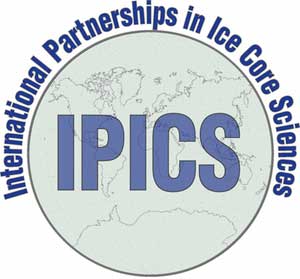 Ice cores provide unique quantitative knowledge about past climate change, and have become one of the most persuasive symbols of the importance of polar science. 24 nations have active ice core programmes, and are represented in International Partnerships in Ice Core Sciences (IPICS).
Ice cores provide unique quantitative knowledge about past climate change, and have become one of the most persuasive symbols of the importance of polar science. 24 nations have active ice core programmes, and are represented in International Partnerships in Ice Core Sciences (IPICS).
This past March the ice core community met in Hobart (Australia) at the second IPICS open science conference (OSC). About 220 researchers attended the conference, which followed a very successful 1st OSC in France in 2012. The meeting was preceded by a 1-day workshop of Ice Core Young Scientists (ICYS). That so many early career scientists could attend the OSC and ICYS workshop was due to the excellent work of the local organisers, led by Tas van Ommen, and the generosity of a range of sponsors including SCAR, for whom IPICS acts as an expert group. The oral and poster sessions, running over 4.5 days, covered the whole range of topics amenable to study with ice cores, from compilations of records over a few centuries (from both polar and non-polar sites) to the use of ice cores to understand ice dynamics and biogeochemical cycles. Technical aspects such as improvements in age models and new proxies were explored. Two topics that were especially prominent concerned the Antarctic in particular. The first is that of understanding the history of the West Antarctic Ice Sheet, with a new emphasis on learning how much of it survived the last interglacial. There was also a lot of anticipation about attempts to find the so-called “oldest ice”: extending the ice core record back towards 1.5 million years. Much exploratory geophysics and modelling is underway to find the right site and a number of consortia have ambitions to obtain this old ice within the next decade. The last formal presentation of the meeting was given by the Martha T. Muse 2015 Prize recipient, Valérie Masson-Delmotte, who outlined how ice core findings have contributed to policy debates through the IPCC.
The OSC allowed delegates plenty of time for social interaction, and included a special showing of the new movie, “Ice and the Sky” which features the career of French Antarctic ice core scientist Claude Lorius.
The IPICS SSC met during the meeting to confirm and renew the community’s scientific priorities. A survey carried out at the end of the meeting confirmed the enthusiasm of participants for the style and content of the OSC, with the vast majority agreeing that it was better or much better than other meetings they had been to recently. The SSC therefore agreed to continue the series with a 3rd OSC in 2020.
Contributed by Eric Wolff, co-chair of SCAR’s IPICS Expert Group
